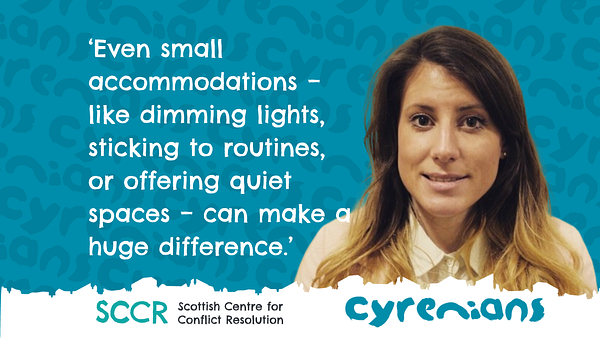It Takes All Kinds of Minds
Explore what neurodiversity means and how we can better support neurodivergent individuals in everyday life, education, and relationships.

As part of our online conference, Nelly Whaley, Training Manager at Salvesen Mindroom Centre, delivered an engaging and insightful online workshop titled It Takes All Kinds of Minds. The session invited attendees to explore what neurodiversity means and how we can better support neurodivergent individuals in everyday life, education, and relationships.
What Is Neurodiversity?
Drawing on the work of Dr. Nick Walker, Nelly emphasised that there is no single 'right' kind of brain. Everyone has a unique nervous system – and that’s normal. Neurodiversity is not about deficits or brokenness; it’s about natural variation.
With 15–20% of the population considered neurodivergent – and potentially more, due to masking – it's essential to shift perspectives. As Nelly pointed out, when up to 50 percentage of the prison population and many excluded from education are neurodiverse, it signals a serious systemic failure to support these individuals.
Understanding Neurominorities
Nelly introduced a wide range of neurodivergent profiles, including:
- Autism
- ADHD
- Dyslexia and dyscalculia
- Dyspraxia
- Tourette syndrome
- Foetal alcohol syndrome
- Acquired brain injury
- Intellectual disability
- Mental health conditions
These conditions often co-occur. For example, only 30 percent of people with ADHD have it as a sole diagnosis. Co-occurrences can significantly affect how needs present, making individualised support essential.
Neurodivergent Experiences and Needs
The workshop explored the challenges neurodivergent individuals may face, including:
- Sensory sensitivities
- Information processing difficulties
- Emotional regulation issues
- Executive functioning challenges
- Social communication differences
These experiences can be compounded by environments that aren’t designed with neurodivergent needs in mind. Even small accommodations – like dimming lights, sticking to routines, or offering quiet spaces – can make a huge difference. Nelly urged participants to adopt trauma-informed approaches and be mindful of the mental health toll caused by bullying or social exclusion.
Communication Differences and Sources of Conflict
Neurodivergent people often communicate in ways that don’t align with neurotypical expectations. Social interactions can be especially challenging. Cultural norms, such as making eye contact, may be painful for some neurodivergent people. Others may prefer texting over face-to-face conversations. These differences can lead to misunderstanding and conflict, especially within families or peer groups. A neurodivergent person might be perceived as rude or withdrawn when they are simply overwhelmed or processing differently. Nelly stressed the importance of recognising that conflict often arises not from intention but from different communication styles, misinterpreted behaviour, or environments causing overwhelm.
Recommendations for Allies, Families, and Professionals
Nelly encouraged professionals and families to focus on strengths. Ask neurodivergent individuals what they enjoy or are passionate about—they may have deep knowledge or hyperfocus on specific topics, often coupled with honesty and directness.
She also recommended:
- Being open minded to different communication styles
- Flipping the conversation to what a young person can do, rather than what they struggle with
- Viewing behaviour through the 'iceberg model' - most challenges lie beneath the surface
- For parents, seeking peer support and joining parenting groups can help reduce isolation and promote learning and understanding.
- Creating supportive environments is essential to help neurodivergent individuals thrive. You could do this by being aware of potential stressors, reducing sensory triggers, offering quiet spaces, and providing structure and routine.
- Being clear about changes and expectations in advance
What Needs to Change?
Nelly closed with a call for systemic change. She advocated for embedding neurodiversity at the heart of teacher training—not as a one-off module—and for financial investment to ensure the presence of trained support staff in schools. Awareness, resources, and compassion are the foundations of true inclusion.
You can watch Nelly's talk below.





